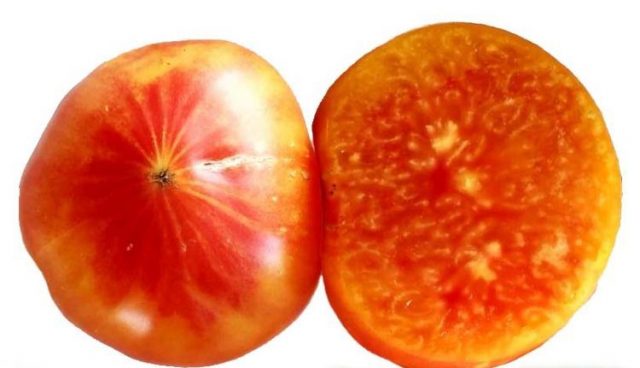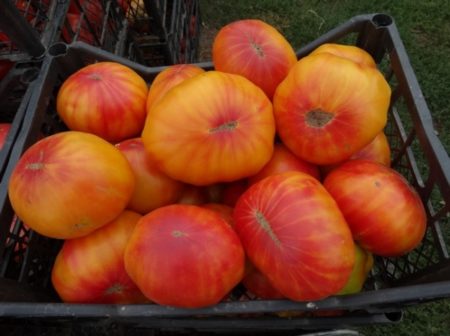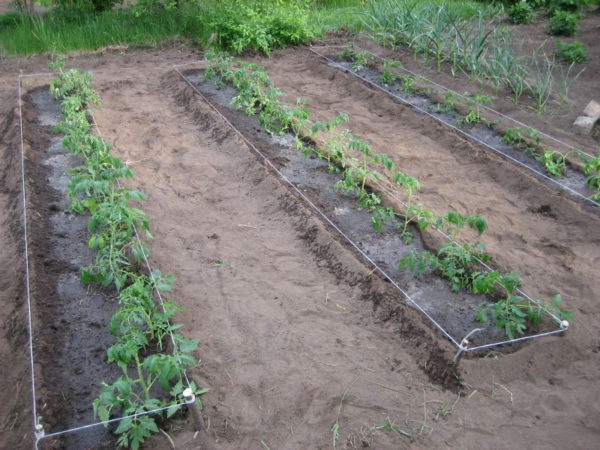Content
The Village tomato is famous for its large fruits and unusual colors. The Russians have just begun to get acquainted with the new variety, and seeds are rarely found on sale in specialized stores. But those who have planted Derevensky tomatoes from the Partner firm at least once are not going to give up the variety.
Description of the tomato variety Village
Rustic tomatoes are determinant varieties. The height of the bushes reaches 1.5 m. Tomatoes are distinguished by a powerful and thick stem. The leaves are dark green, densely located on the stems. To obtain a decent harvest, it is necessary to form bushes of 2-3 stems.
Tomato variety Rustic late ripening, mass ripening begins 125-140 days after germination. The plant is thermophilic; it is recommended to grow outdoors in the southern regions. In the rest of Russia, it is better to use protected ground.
Description of fruits
The Village variety can be identified by flat-round fruits, the mass of which ranges from 300 to 600 g. Although sometimes tomatoes weighing about 900 g grow, the color of ripe tomatoes is yellow-orange, red stripes all over the surface, starting at the top and diverging throughout the fruit.
On the cut, the pulp is orange, the acidity and sweetness are balanced. If we talk about the aroma, then there are fruity notes in it. There are few seed chambers.
Fleshy fruits look great in fresh salads, from which tomato juice and pasta are prepared. But it will not work to preserve the Village tomatoes for the winter, since the fruits are too large. But a salad of slices of tomatoes with onions for the winter turns out to be amazing.
Characteristics of Rustic Tomatoes
Tomato variety Derevenskie - high-yielding. Up to 45 large fruits are most often formed on one bush. About 6 kg of sweet tomatoes are harvested from the bush. If the fate is that when landing on 1 sq. m 3-4 bushes are planted, then the yield is really amazing. Such results can be achieved if you follow the rules of agricultural technology.
Village tomatoes are resistant to many crop diseases. But it is not always possible to avoid late blight, spotting, which can significantly reduce the yield and quality of fruits. That is why it is recommended to treat the soil with fungicides before planting and spray the bushes in the open ground or greenhouse with preparations:
- Ridomil Gold;
- Fitosporin;
- "Quadris".
You can get rid of moths, cicadas, aphids with the help of special insecticides.
Advantages and disadvantages
Each cultivated plant has its own advantages and disadvantages. But when creating new varieties, breeders try to give the plants the best qualities.
Pros possessed by the Derevensky tomato variety:
- Large-fruited, the possibility of obtaining a large number of fruits for the manufacture of juices and tomato paste.
- Stable yield.
- Excellent taste.
- Dense fruits, do not crack during transportation, do not flow.
- Decent resistance to diseases and pests.
Unfortunately, the breeders failed to completely avoid the shortcomings. The Rustic tomato variety also has them:
- Caring for plants is a little complicated, since, in addition to normalized watering, it is necessary to do pinching and feeding.
- High soil moisture leads to cracking of the fruit.
- Whole tomatoes cannot be canned.
Growing rules
According to gardeners, no special agrotechnical standards for the cultivation of Derevenskie tomatoes are required, except for the regulation of watering and timely feeding. This is because each bush quickly selects nutrients from the soil.
Sowing seeds for seedlings
As a rule, Derevsky tomatoes are grown through seedlings. This is due to the late ripening of the fruit. The seedling method of growing is especially important for gardeners living in the area of drawing farming.
Preparation of containers and soil
For sowing, you can use containers, separate cups. If the containers are not used for the first time, then they are first washed well, then poured over with boiling water.
You can take garden soil by adding humus, compost, wood ash to it, or you can use ready-made store soil. To avoid damage to plants with a black leg or other fungal diseases, any soil is watered with boiling water with the addition of several crystals of potassium permanganate.
Seed preparation
Seeds also need to be prepared:
- They can be soaked in a 1% solution of potassium permanganate for 20 minutes. Then rinse with clean water.
- Use Fitosporin for soaking in accordance with the instructions.
- The soaked seed is slightly dried before sowing.
Sowing seeds and caring for seedlings
Before starting work:
- The soil is slightly moistened with a spray bottle with water at room temperature, then furrows are made no more than 1-2 cm deep at a distance of 3-4 cm.
- Seeds are laid out at a distance of 3 cm so that at first the plants do not interfere with each other. After sowing, the containers are covered with glass or foil and removed to a room with good lighting and temperatures up to +23 degrees.
- Before germination, you need to check the moisture content of the topsoil, if necessary, spray with a spray bottle so as not to wash the seeds.
- When the first hooks appear, the shelter is removed, the container is placed in a room with a temperature of 16-18 degrees for 1-2 days, but with good lighting. This will avoid pulling the seedlings out.
After watering, the soil surface must be loosened to a shallow depth (no more than 0.5 cm). During the growth of seedlings, the soil should not be allowed to dry to a depth of 1 cm, otherwise the root system will slow down its development, and, therefore, the plant will form unevenly.
Picking and hardening
If the seedlings are grown in separate cups, then you do not need to dive. As a rule, in this case, 2-3 seeds are planted in a container. When 2-3 true leaves appear on the Derevensky tomato, the weak and underdeveloped plants are pulled out, leaving only the strong ones. After that, the surface is loosened, and fresh soil is poured up to the cotyledon leaves.
When growing seedlings in shared containers, each plant must be transplanted into separate cups. The soil is prepared in the same way as before sowing the seeds, and it is not recommended to change the composition. Soil is poured into glasses, a hole is made in the center and a plant is inserted into it. Planting depth - up to cotyledon leaves.
Transplanting seedlings
The timing of planting in open or protected ground depends on the growing region. In any case, they are guided by the weather conditions. It is easier with a greenhouse, but Derevensky tomatoes are planted on the street after the threat of a return of spring frosts disappears. For 2 weeks, the seedlings are hardened, the plants are taken out of the house.
Before planting, the soil is dug up, compost, humus and wood ash are added. The wells are filled with hot water with potassium permanganate.
For 1 sq. m it is recommended to plant 3-4 bushes of tomatoes of this variety. In this case, the plants will have enough room to develop. Immediately after planting, the plants are watered.
Tomato care
Further care for the Derevensky tomato variety is practically no different from the agricultural technology. Activities are reduced to watering, feeding, loosening.
Watering
It is necessary to water the bushes of the Derevensky tomato varieties regularly, not allowing the soil to dry out, but the swampy state should not be allowed. Particular attention should be paid to watering during the period of filling and ripening of fruits. Excessive soil moisture can lead to cracking of the tomatoes.
For irrigation, warm, settled water is needed. It is necessary to irrigate the bushes only at the root, avoiding soaking the leaves and fruits, which can provoke diseases. Watering should be accompanied by loosening.
Top dressing
You need to be careful with feeding the Village variety. After 2 weeks, it is recommended to feed the plantings with nitrate: per 1 sq. m - 80-100 g. In the future, organic fertilizers are applied: tomato bushes are watered with infusion of green grass, mullein, but before the tomatoes are poured.
Stepson and tying
Tall tomatoes of the Derevenskie variety require mandatory tying, and not only stems, but also brushes, since the fruits can break them off. Plants are grown in 2-3 stems, all other stepchildren need to be pinched at a height of 1-2 cm.
Conclusion
The Village tomato is a profitable crop variety. A high and stable yield will allow you to get the right amount of fruit. If the dacha is far away, then transportation will not cause any particular difficulties. The tomatoes will be delivered safe and sound.











